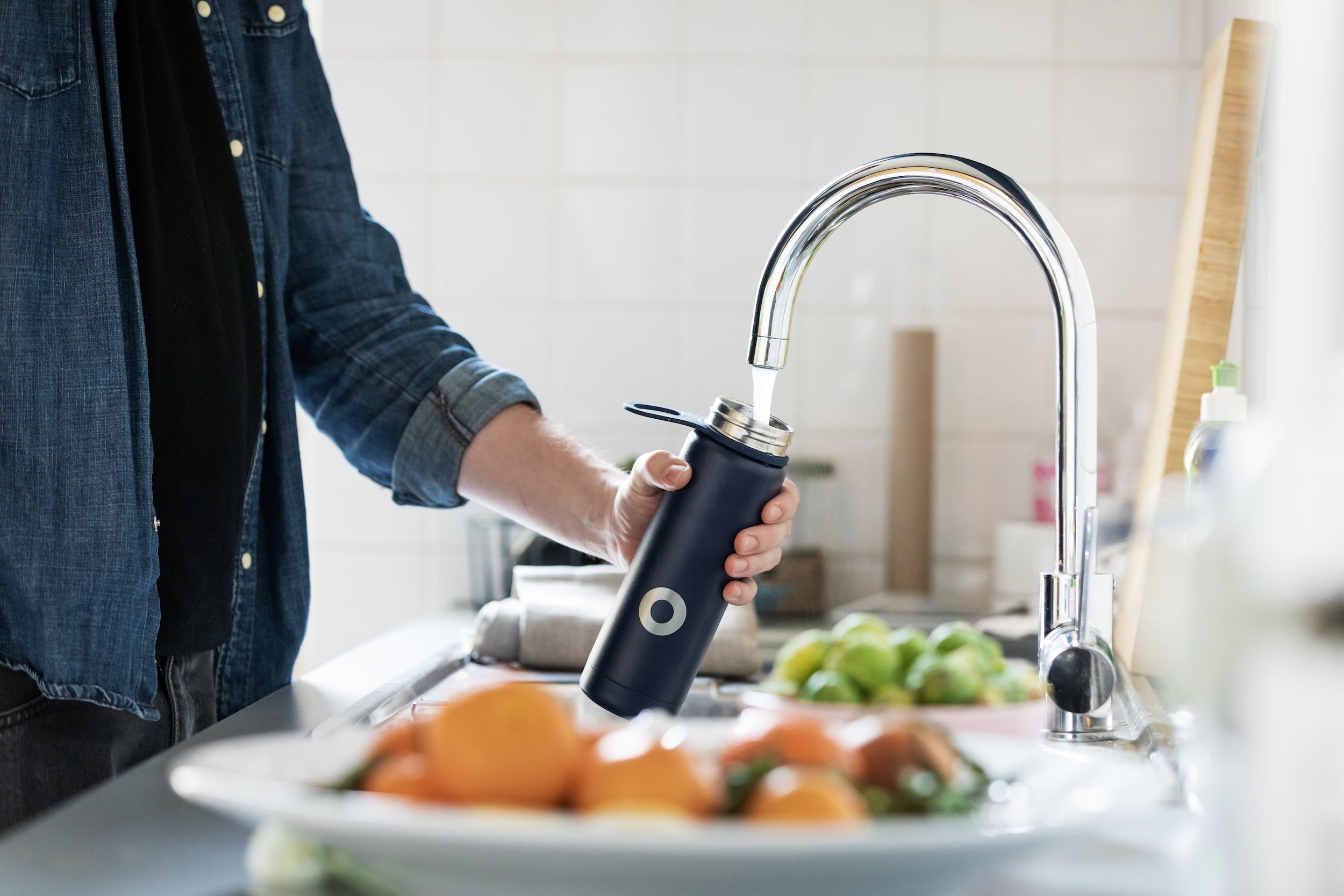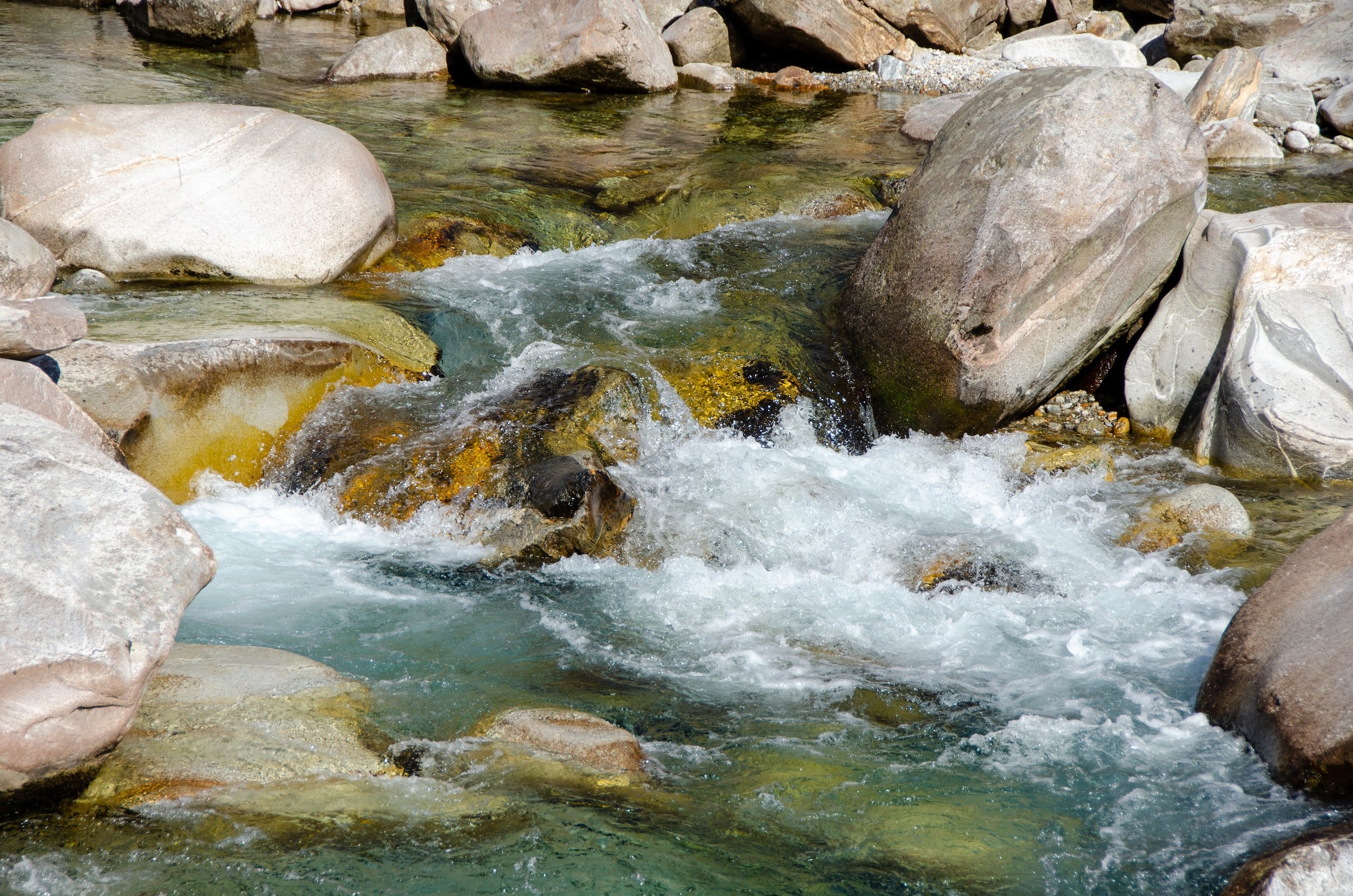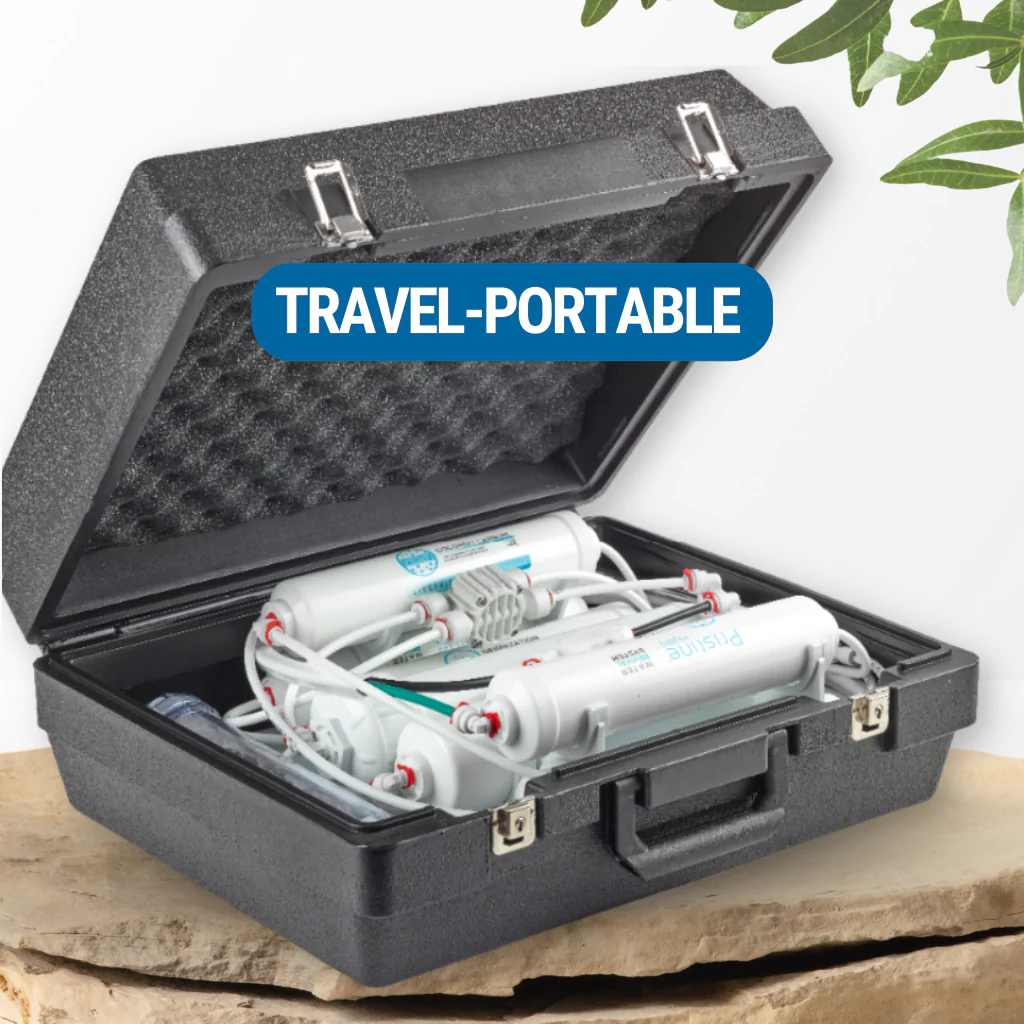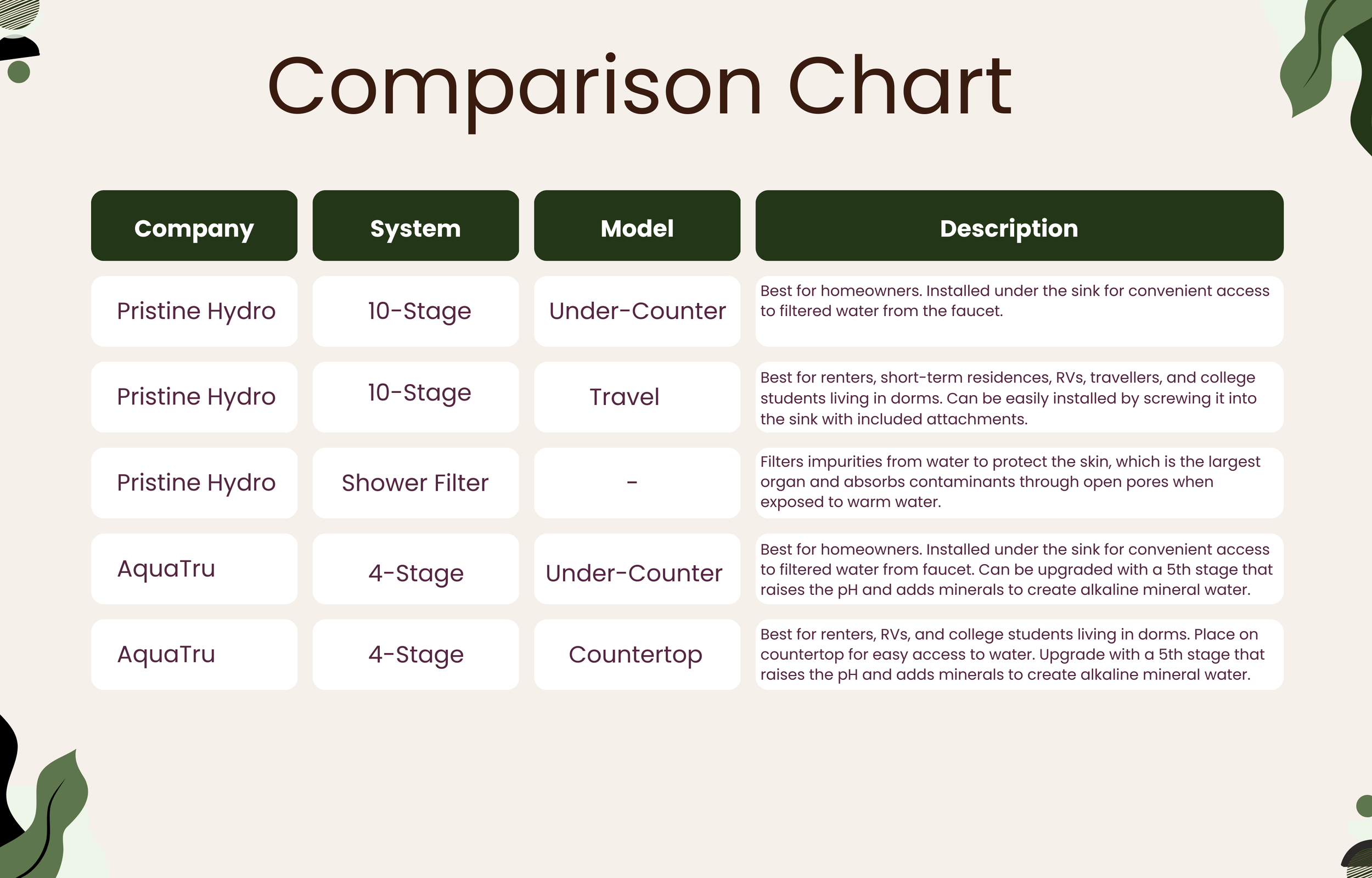The Benefits of Investing in a Water Filter
Most people don't know how important it is to drink water that has been filtered. Even though tap water is filtered, there are still some chemicals and bacteria in it. If you continuously consume unfiltered tap water, it could have a negative impact on your health.
You can make sure the water you drink is safe and free of harmful substances by buying a good water filter. In this blog, we'll talk about the benefits of buying a water filter and how it can help you stay healthy and avoid getting sick from polluted water.
Why is using a water filtration system important?
Heavy metals like lead, arsenic, mercury, chlorine and other by-products of disinfection can all be removed from your drinking water by filtering it. The best way to ensure your water supply is safe is to filter it since these harmful substances can get into the water from various places.
High-quality filters are made to eliminate these impurities and ensure that the water you and your family drink is clean and safe. Also, some filters may be able to get rid of some of the bad tastes and smells in drinking water that is caused by chlorine or other chemicals.
How is city water filtered?
According to the CDC, "Public drinking water systems use different water treatment methods to provide safe drinking water for their communities. Public water systems often use a series of water treatment steps that include coagulation, flocculation, sedimentation, filtration, and disinfection."
Step 1: Coagulation and Flocculation
Chemicals are added to the water that binds contaminants.
Step 2: Sedimentation
The “floc” or chunks are removed after settling into the water tank's bottom.
Step 3: Filtration
To lower the concentration of impurities including bacteria, parasites, and other microorganisms, the water is then passed through filters made of sand, gravel, and/or charcoal.
Step 4: Disinfection
To get rid of leftover microbes, water is treated with disinfectants such as chlorine or chloramine.
Source from CDC.gov/drinkingwater
How clean is your water?
Although it may seem from reading about standard city water filtration methods that they do a great job of purifying our water, this is far from the case.
Environmental Protection Agency of the United States
Cities are required to fulfill the water quality standards set by the EPA, but it has been nearly 20 years since they last updated the standard for tap water. Over 40 years have passed since certain measures were updated! The legal pollutant limitations set by the federal government do not protect public health.
Never forget that something is not necessarily safe just because it is legal.
The Environmental Working Group
Since 1993, the Environmental Working Group has drawn attention to out-of-date laws, dangerous farming methods, and business loopholes that endanger both human health and the environment. EWG's Who We Are/Our Mission page can be found at this link.
Even "clean" drinking water that comes from the tap, according to EWG, isn't what most of us would consider being clean. Through miles of pipeline, it has travelled, accumulating pollutants and runoffs. Additionally, it is cleaned using chemicals that leave behind carcinogenic by-products.
Without disinfection, waterborne illnesses would be a constant issue. Disinfection is a necessary evil. Because of this, it's crucial to use high-quality water filters to filter our tap water.
Check the link for the EPA requirements and the EWG standards for comparison: https://www.ewg.org/tapwater/ewg-standards.php
Test your water
Use the EWG tap water database to view the pollutants in your local water supply. Additionally, you can buy test kits online and engage a business to check your water.
If you have a private well, you may either pay a business to test your water or buy test kits online.
What’s in the water we drink?
A recent study by the Environmental Working Group found that more than 320 harmful compounds are in the drinking water systems that more than 85% of the people in the United States use. More than half of those are not subject to EPA regulation. Over time, the water only gets dirtier as a growing number of new chemical compounds are added to the mix almost every day.
Because of the amount of PFAs, which are often called harmful "forever chemicals", our water supply has become so dirty that our rainwater is very polluted.
PFAs, medications (like birth control, antidepressants, etc.), heavy metals like mercury, lead, and arsenic, VOCs (volatile organic compounds), pesticides, herbicides, microplastics, etc. are all common contaminants that can be found in tap water.
Many of these contaminants can hurt our health on their own, but this is especially true if they build up in our bodies over time. All of this is the result of decades of dumping industrial waste, polluting sewage systems, polluting farms, rusting water pipes, mining, the oil industry, big pharma, and other things.
All of this is on top of the fact that harmful chemicals like chlorine and chloramide are used to clean our water. Also, things like fluoride are added for "public health" reasons, even though they are very bad for health, especially for kids.
What negative consequences on health might drinking tap water have?
Most people don't know that the water they drink and bathe in every day could be making them sick with things like acne, skin diseases, hair loss or thinning, digestive problems, bloating, dry skin, feeling tired all the time, and gaining weight.
There are many chemicals found in tap water that has been linked to a wide range of health problems, such as cancer, birth and reproduction problems, brain development problems, and more.
Toxins in unsafe water can cause a wide range of illnesses, such as all auto-immune diseases and neurological problems, such as chronic fatigue syndrome.
PFAs have been linked to several serious health problems, such as cancer, learning and behaviour problems in children, trouble getting pregnant and infertility, high cholesterol, and problems with the immune system, among many others. This is one of the things that can make our water dirty.
The Environmental Working Group (EWG) has a great resource that tells you about the toxins in contaminated water and how they affect your health.
Are there other "clean water" options?
Bottled Water
In general, bottled water isn't any safer, healthier, or cleaner than tap water. In contrast to bottled water, the federal government mandates much more stringent and regular safety testing and monitoring of municipal drinking water. There is no way to determine where the water in water bottles is coming from, despite the labels reading "spring water" or "naturally sourced water." Spring water can be from any spring and naturally sourced water is often simply municipal tap water.
Additionally, the chemicals in plastic water bottles leach into your water, especially if they are left outside in the sun adding health risks. Water bottles made of plastic have been directly connected to the very dangerous chemical bisphenol A (BPA). BPA is a weak synthetic estrogen that the body can either block or mimic. Plus, it can disrupt thyroid hormones and has been directly linked to breast cancer in some scientific studies.
Bottled water wastes a lot of water since it takes three times as much water to create the bottle as it does to fill it, and the plastic bottle itself takes 300 years to decompose. By filtering tap water at your home or business, you will be helping the environment. If you find yourself in a scenario without your filtered water bottle, try to get a glass bottle.
Boiling Water
Boiling water will kill disease-causing germs, including viruses, bacteria, and parasites but it is not a method of filtration. Boiling water will concentrate contaminants.
Spring Water + Mountain Water
This is a terrific alternative if you have access to contaminant-free spring water or mountain water. Though, it is thought that all rainwater that falls on Earth is contaminated; making finding uncontaminated water challenging.
Additionally, there is a significant probability that the soil is polluted if there are any nearby towns or ski resorts, which means the water will likely be polluted as well and require additional filtration.
What methods are there for filtering water?
Common filters
Some contaminants will be taken out by common filters like BRITA, which is better than tap water but shouldn't be relied on.
Brita can help get rid of some impurities and bad tastes or smells in water, but it's not very good at getting rid of most medicines, microorganisms, arsenic, fluoride, nitrates, hard water, radioactive metals, PFAs (forever chemicals), and other things.
Most Brita systems also need to have their carbon filter changed "quite often." For two of their three pitcher models, the average amount of water that should pass through the filter before it needs to be changed is 40 gallons. That means you have to change it every week or two weeks.
Distillers
In distillers, water is heated until it evaporates. When the water vapour turns back into liquid, the water will once again be clean. Not only does distilled water not have any pollutants in it, but it also doesn't have any minerals or electrolytes unless you add them back in. It is often called "aggressive water" because of this and can have negative health effects.
Distilled water may pick up harmful substances from pipes, containers, bottles, and other things it comes in contact with. If you buy distilled water, make sure it's in glass and not plastic.
Reverse Osmosis
This system works by pushing water through a semi-permeable membrane from an area of high particle concentration to an area of low particle concentration.
Even though not all RO systems are the same, this is often a good alternative, especially since many RO systems have more than one stage of filtration. This membrane is used to keep impurities from getting into the water that has been filtered. A good, multi-stage RO system can remove almost all toxins from water. However, it will also remove minerals. Because of this, you should make sure to add minerals back into your drinking water.
What advantages can water filters offer?
Using a water filter has more benefits than just getting rid of impurities.
Filtered water tastes and smells better:
When impurities are taken out of the water, it also tastes and smells better. After drinking filtered water, you'll feel more satisfied because it tastes better and has a more refreshing taste. Tap water tends to taste and smell like chlorine, whereas distilled water has most of the minerals removed and so it will taste very bland. Filtered water removes contaminants, but leaves in the minerals make water taste good.
Your health is improved by water filtration:
Water filtration systems are good for your health. The benefits are tenfold: hydration of the skin, better absorption of vitamins, weight loss, detoxification, better digestion, and a lower risk of cancer. Drinking purified water is good for your immune system and your mind.
What filters do we prefer?
When it comes to choosing a water filter system, there are many options available on the market. Two popular companies and our favourite that offer a range of water filter systems and models are Pristine Hydro and AquaTru. In the following table, we will take a closer look at the different systems and models offered by these companies, as well as the features and benefits of each.
Pristine Hydro offers a 10-stage system with advanced filtration techniques such as reverse osmosis, re-mineralization, and water restructuring. They have two water filter models available: an under-counter model that is best for homeowners, and a travel model that is ideal for renters, short-term residences, RVs, travellers, and college students living in dorms.
Pristine Hydro offers a shower filter that helps protect the skin from impurities in the water. As the skin is the largest organ and its pores open when exposed to warm water, it is important to invest in a shower filter to remove impurities. While taking a cold shower may reduce the number of pores that open and the number of contaminants absorbed, it is not always practical. The best solution is to use a shower filter to ensure that the water is clean and pure.
AquaTru has a 4-stage reverse osmosis filter system that can be upgraded with a fifth stage that raises the pH and adds minerals like calcium and magnesium to create alkaline mineral water. They offer two models: an under-counter model that is best for homeowners, and a countertop model that is great for renters, RVs, and college students living in dorms.
Now, let's take a closer look at the specific systems and models offered by Pristine Hydro and AquaTru in the following table.
















